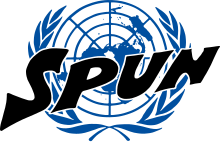United Nations student simulation game
The United Nations (SPUN) student simulation game is the oldest German-language UN simulation . It took place for the first time in 1997 in Siegen and has taken place annually in Bonn since 1999 .
history
In 1991 the idea of the SPUN was born by Dragan Jovanivic. The idea found support from 1995 onwards from the historian Gerhard Brunn, who teaches at the University of Siegen , and the Freudenberg Gustav Heinemann Academy of the Friedrich Ebert Foundation , which was thinking about new educational opportunities for young people at the time. The first preparatory seminars took place in 1995. In August 1997 the first week of meetings took place at the University of Siegen. For the year 1998 the meeting week was advertised nationwide. Since the same year SPUN has been recognized by the United Nations . The SPUN has been taking place in Bonn since 1999.
Patrons of the simulation game were or are the then Federal President Johannes Rau (1998–2000), the then Bundestag President Wolfgang Thierse (2000–2005), the former Federal Minister of the Interior . D. Gerhart Baum (since 2008) and - together with the aforementioned - the former mayor of Bonn Bärbel Dieckmann (2009) and the then SPD parliamentary group leader and current federal president Frank-Walter Steinmeier (2012-2013).
Reception and effect
As an example of the integration of participatory methods in political work, SPUN found its way into school books, including in the Forum Geschichte of Cornelsen Verlag . The UNESCO educational strategy publication Culture of Peace also mentions the United Nations simulation game for students as an example for Model United Nations, which convey political education in a special way.
The first general secretary in 1997 was Sebastian Hartmann, who is now a member of the Bundestag .
organization
The sponsor is the non-profit association “Schüler-Planspiel United Nations e. V. ". The SPUN is organized by pupils for pupils, which means that mostly previous participants meet regularly to organize the United Nations simulation game for pupils.
Course of the session week

In advance, groups of pupils from the upper secondary school apply for representation in a particular country. Once they are assigned a country, these groups are called delegations.
During the week of the session, the United Nations organization is to be simulated. At the beginning of the session week, the delegations present their countries in the context of the opening speech. Later the delegates split up into the committees. The general assembly meets at the end of the session week.
Comparison with the United Nations
The course of the session week of the United Nations student simulation game should be similar to that of the United Nations session week. The SPUN has a charter and rules of procedure . The organization attaches great importance to appropriate clothing.
However, there are also differences. While SPUN has the “General Assembly” committee, in which only 42 states were represented in 2015, and the “General Assembly”, in which all states are represented, the UNO only has the General Assembly , which corresponds to the “General Assembly” of SPUN.
See also
Web links
- United Nations student simulation game
- United Nations student simulation game on Facebook
- 2001 manual in the web archive ( Memento from June 5, 2001 in the Internet Archive )
swell
Individual evidence
- ^ "Greetings from the patron". In: Handbuch 2001 ( Memento of June 5, 2001 in the Internet Archive ), p. 2
- ↑ Gerhart Baum : Greetings from the patron. 2017, Retrieved November 17, 2017 .
- ↑ Telis Koukoullis: Schoolchildren simulate UN session week . In: General-Anzeiger (Bonn) . June 25, 2009. Retrieved June 25, 2018 .
- ↑ SPUN history. United Nations student simulation game, accessed on June 25, 2018 .
- ↑ Gerburg Harenbrock, Kerstin Kellmann, Hans-Otto Regenhardt, Arnulf Siebeneicker, Claudia Tatsch, Andrea Welk: Forum history . General edition. Ed .: Hans-Otto Regenhardt, Claudia Tatsch. tape 4 . Cornelsen Verlag , Berlin 2003, ISBN 978-3-464-64322-8 , pp. 172 f .
- ^ Organization of the United Nations for Education, Science and Culture , Berlin Committee for UNESCO Work e. V. (Ed.): Culture of Peace . A contribution to the educational mandate of UNESCO: Building Peace in the Minds of Men and Women. February 2017, 7.6 - Model United Nations, p. 105 ( unesco.de [PDF; accessed June 25, 2018]).
- ↑ Urs Zietan: USA without voting rights in climate protection. In: General-Anzeiger (Bonn) . June 26, 2001. Retrieved September 5, 2017 .
- ↑ General Secretaries look back. United Nations student simulation game, accessed on September 5, 2017 .
